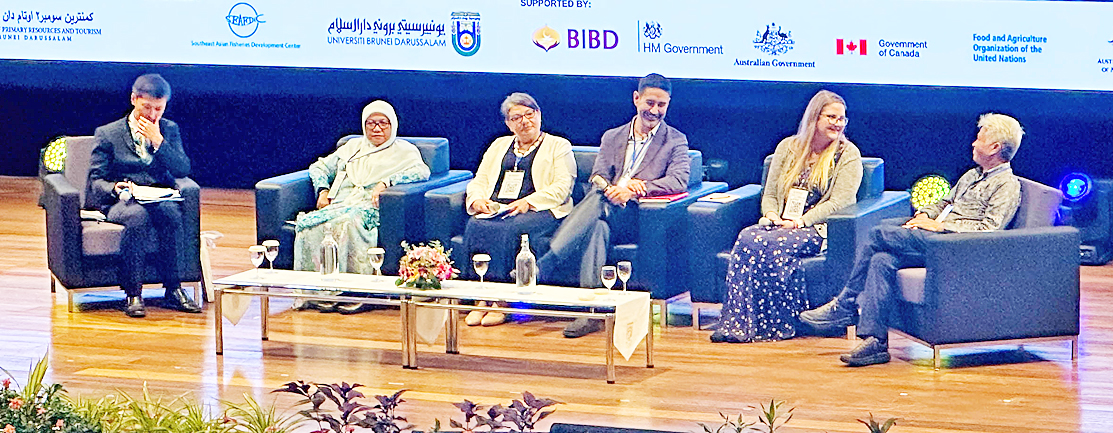Adib Noor
Local and international experts discussed and shared ideas on the importance of marine conservation in the first session of the Sustaining Marine Biodiversity Through Blue Economy Symposium, ‘Blue Economy: Balancing Economic Growth with Marine Conservation’ as part of the Brunei Mid-Year Conference and Exhibition (Brunei MYCE 2023) held at the Pro Chancellor Arts Centre, Universiti Brunei Darussalam yesterday.
The panellists for the first session were Universiti Teknologi Brunei (UTB) Vice-Chancellor Datin Paduka Professor Dr Hajah Zohrah binti Haji Sulaiman; senior lecturer and Head of Postgraduate Studies at Australian National Centre for Ocean Resources and Security (ANCORS), University of Wollongong in Australia, Dr Camille Goodman; principal research scientist at the Australian Institute of Marine Science Dr Manuel Gonzalez Rivero; marine ecologist at the Centre for Environment, Fisheries and Aquaculture Science (CEFAS), United Kingdom, Lisa Benson; Asia transboundary oceans senior advisor at Conservation International in Singapore Ketut Putra.
The panel discussed how billions of people are dependent on marine ecosystems for a range of benefits, which include food security, economic growth, employment and ecosystem services provided by the ocean.
However, climate change and intensification as well as expansion of anthropogenic activities are increasingly threatening the ecosystems.
Datin Paduka Professor Dr Hajah Zohrah shared that the oldest blue economy is the fisheries sector. However, global fisheries remain a challenge including the impact of declining stocks and human population growth, while Covid-19, biodiversity loss, and climate change have added pressure.
She stressed that blue transformation through effective management for all fisheries is vital.


“An example where the results of a study can be used to draw an effective management plan for ensuring long-term sustainability is the finfish populations in the Galapagos Islands, located in the Pacific Ocean. In 1998, about 138,000 square kilometres of the sea around the islands was declared as the Galapagos Marine Reserve (GMR), which is one of the largest marine protected areas in the world,” she said.
She added that the Galapagos finfish fishery resource from both demersal and pelagics includes 68 species representing 27 families. The growth of the artisanal fishing sector is paralleled by a rapid population increase in the Galapagos Islands from 1,500 people in the 1950s to 30,000 in 2020. Unlike sea cucumber and lobster fisheries which decline in abundance, the Galapagos finfish stocks, except sailfin grouper (myctroperca olfax) have so far been spared by overfishing.
She said that a study of over 30 years suggested severe overfishing of the species in the GMR. Sustainable management practices, species-specific management actions and fishing regulations have helped to conserve the marine fish fauna of the Galapagos Islands. Another highlight of the session is the importance of preserving the environment.
Dr Rivero said that worldwide, approximately 850 million people live within 100 kilometres of coral reefs, they are likely to derive benefits from the ecosystem.
Reef condition is a valuable and sensitive indicator of coastal ocean health, climate change impacts, and ocean acidification, with associated implications for society. Monitoring coral reef status and trends is essential to inform better coral reef management, policy development and future science needs.
With that in mind, the marine resource initiative was introduced, a research endeavour co-designed with interested ASEAN nations to support in-country coral reef monitoring through the tailored development and application of technological solutions.
One technological solution was ReefCloud, a user-friendly, open-access platform poised to transform global coral reef monitoring and management by allowing the world’s coral reef monitoring community to work together, in real time, he said.
ReefCloud is a digital tool that uses machine learning and advanced analysis to rapidly extract and share data from images of coral reefs anywhere in the world.
Dr Rivero shared that the Brunei Department of Fisheries and the Australian Institute of Marine Science are working to support the advancement of national coral reef monitoring, its integration and reporting through technology to inform conservation actions.
The project will deliver a standard framework to assist national science organisations in collecting, processing, and visualising coral reef monitoring data in the Sultanate to improve access to coral reef science for management actions that will support the future of Brunei’s coral reefs.


